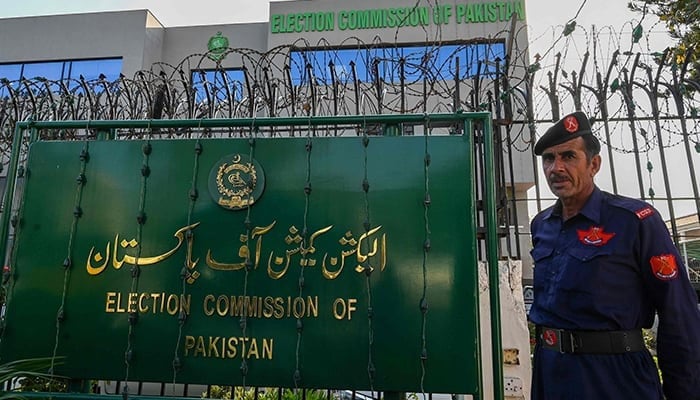After days-long deliberation, ECP seeks SC's guidance on reserved seats conundrum
Asks whether it follows the SC verdict or amended Election Act to decide on reserved seat allocation
September 26, 2024

- ECP says reserved seats' amended laws were applied retroactively.
- Adds civil miscellaneous application filed to seek SC's advice.
- "Additional grounds were added to previous review on SC verdict".
ISLAMABAD: The Election Commission of Pakistan (ECP) has once again approached the Supreme Court to seek its guidance whether to follow amended Election Act 2017 or its judgment on the matter of allocating reserved seats to the Pakistan Tehreek-e-Insaf (PTI).
In its plea on Thursday, the top electoral authority mentioned the National Assembly Speaker Ayaz Sadiq's letter stating that amendments were made to the Election Act after the top court's verdict declaring the opposition party eligible for the reserved seats.
It is worth mentioning here that Speaker Sadiq had told the ECP in his letter that the apex court's July 12 ruling was "incapable of implementation" after the amendments to Election Act 2017.
The ECP sought SC's advice on whether to prioritise the amended Election Act or the detailed verdict to resolve the reserved seats' row.
It also informed the SC that denotified lawmakers had also approached to seek implementation of the amended law and the ECP implemented the court order to the extent of 39 Members of the National Assembly (MNAs).
The amended act has been applied retroactively with modified laws relating to reserved seats, the ECP stated.
It added that the court gave clear verdicts that parliament's wisdom could not be reviewed, therefore, it would be a question mark if the Election Act is not implemented in view of the court orders.
In his last week's correspondence, the NA speaker urged the ECP to maintain the supremacy of parliament by allocating reserved seats in accordance with the Election Act Amendment Bill.
He pointed out two "particular provisions" — amendments to Section 66 and Section 104-A, which he said, were relevant for the ECP's consideration.
In its amendment to Section 66 of the Elections Act, the bill says that if a candidate does not submit a declaration of his affiliation with a political party to the returning officer (RO) before seeking allotment of the election symbol, they shall be "deemed to be considered as an independent candidate and not a candidate of any political party".
Meanwhile, the amendment to Section 104 reads that the declaration, consent or affidavit, by whatever name called, of an independent returned candidate once given for joining a political party shall be irrevocable and cannot be substituted or withdrawn.
"As the SC judgement was rendered based on the law prior to the enactment of the amendment, the said judgment is now incapable of implementation," it said, noting that it is the amended Election Act that shall prevail and supersede the prior ruling.
Following his letter, Sadiq had also changed party position in the lower house of the parliament in which 80 PTI MNAs were shown as Sunni Ittehad Council (SIC) members.
Additional grounds added to previous review plea: ECP
The ECP, after submitted a fresh petition in the apex court today, detailed that it took steps after days-long deliberation on the SC's detailed verdict and the Election Act amendments related to the reserved seats.
A review has been filed on a few points in the Supreme Court's detailed verdict, according to a declaration issued by the ECP, adding that additional grounds were added to the previous review plea.
It stated that a Civil Miscellaneous Application (CMA) was submitted to seek guidance on whether to implement the reserved seats' allocation formula in light of the amended law or the top court's judgment.












